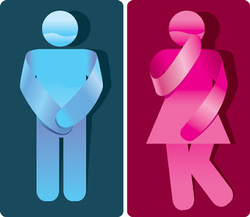
What are the types of urinary incontinence?
If you have urinary incontinence it means that you pass urine when you do not mean to. Incontinence not always manifests the same way. There are basically three types of incontinence:
Stress incontinence
The urinary incontinence that occurs following sudden exertion as coughing, sneezing, laughing, lifting or exercising. Normally it is only small losses and is usually related to the weakening of the pelvic floor muscles.
Urge incontinence
Also known as overactive bladder, Is the most common type of incontinence among men. Occurs sudden need to urinate and bladder involuntarily expels urine. It is generally due to interference of nerve signals between the bladder and brain. It is usually a result of an enlarged prostate or the aftermath of an operation of this gland. The increase affected their frequency voiding during the day and night.
Mixed incontinence
It is usually a combination of stress incontinence and urgency. When you experience both types of incontinence, one of them has more impact than the other, so it is recommended first address the most common symptoms.
Overflow
Is a constant or intermittent flow of urine usually caused by a obstruction or nerve damage.
Functional incontinence
Inability to reach the bathroom in time the complications associated with physical or mental illness.
Urinary Incontinence transient
Is that produced by a concrete fact and disappears after a maximum of four weeks. Often result, for example, with surgical intervention.
Dribbling after urination
It occurs, when the bladder does not empty completely and experienced spotting after urination and is usually due to an enlarged prostate or weak pelvic floor muscles.
Tips on preventing urinary incontinence
Typically urinate four to eight times a day and even once during overnight.
If we hold the bladder in good condition should acquire healthy habits and follow a set of rules, so simple and effective.
1. Drink plenty of fluids. That does not end the day without drinking at least 1.5 liters of water. Avoid alcohol and caffeine and cola.
2. Learn to empty the bladder. You should go to the toilet only when necessary and, of course, before bedtime. Take time to urinate calmly, without haste, to completely empty the bladder.
3. Learn to control yourself. When you pee, try to entertain and do not run to the bathroom. Nor go to the bathroom if you have excessive desire.
4. Take care of pelvic floor muscles. Do pelvic floor exercises.
5. Physical exercise regularly.
6. Increase consumption of foods high in fiber in order to avoid constipation. It should be borne in mind that excessive pressure to empty the intestine ends years weakening of the pelvic floor muscles.
7. Reduce weight.
Read more on remedies to prevent urinary incontinence and How to Get Hard Rock Erection. And More on how to increase penis size for more sexual pleasure.
 RSS Feed
RSS Feed